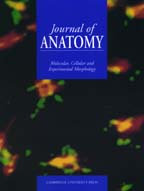Crossref Citations
This article has been cited by the following publications. This list is generated based on data provided by
Crossref.
Heininger, Kurt
2002.
Aging is a deprivation syndrome driven by a germ–soma conflict.
Ageing Research Reviews,
Vol. 1,
Issue. 3,
p.
481.
JI, LI LI
2002.
Exercise‐induced Modulation of Antioxidant Defense.
Annals of the New York Academy of Sciences,
Vol. 959,
Issue. 1,
p.
82.
Carmeli, Eli
Coleman, Raymond
and
Reznick, Abraham Z
2002.
The biochemistry of aging muscle.
Experimental Gerontology,
Vol. 37,
Issue. 4,
p.
477.
Zenteno-Savı́n, T
Clayton-Hernández, E
and
Elsner, R
2002.
Diving seals: are they a model for coping with oxidative stress?.
Comparative Biochemistry and Physiology Part C: Toxicology & Pharmacology,
Vol. 133,
Issue. 4,
p.
527.
REID, MICHAEL B.
and
DURHAM, WILLIAM J.
2002.
Generation of Reactive Oxygen and Nitrogen Species in Contracting Skeletal Muscle.
Annals of the New York Academy of Sciences,
Vol. 959,
Issue. 1,
p.
108.
Speakman, John R.
Selman, Colin
McLaren, Jane S.
and
Harper, E. Jean
2002.
Living Fast, Dying When? The Link between Aging and Energetics.
The Journal of Nutrition,
Vol. 132,
Issue. 6,
p.
1583S.
Ficicilar, Hakan
Zergeroglu, Ali M
Tekin, Demet
and
Ersoz, Gulriz
2003.
The effects of acute exercise on plasma antioxidant status and platelet response.
Thrombosis Research,
Vol. 111,
Issue. 4-5,
p.
267.
Urso, Maria L.
and
Clarkson, Priscilla M.
2003.
Oxidative stress, exercise, and antioxidant supplementation.
Toxicology,
Vol. 189,
Issue. 1-2,
p.
41.
Ookawara, Tomomi
Haga, Shukoh
Ha, Sung
Oh-Ishi, Shuji
Toshinai, Koji
Kizaki, Takako
Ji, Li Li
Suzuki, Keiichiro
and
Ohno, Hideki
2003.
Effects of Endurance Training on Three Superoxide Dismutase Isoenzymes in Human Plasma.
Free Radical Research,
Vol. 37,
Issue. 7,
p.
713.
Radak, Zsolt
Chung, Hae Young
and
Goto, Sataro
2005.
Exercise and hormesis: oxidative stress-related adaptation for successful aging.
Biogerontology,
Vol. 6,
Issue. 1,
p.
71.
Nishimura, Robert N.
and
Sharp, Frank R.
2005.
Heat shock proteins and neuromuscular disease.
Muscle & Nerve,
Vol. 32,
Issue. 6,
p.
693.
Jackson, Malcolm J
2005.
Reactive oxygen species and redox-regulation of skeletal muscle adaptations to exercise.
Philosophical Transactions of the Royal Society B: Biological Sciences,
Vol. 360,
Issue. 1464,
p.
2285.
Vasilaki, A.
Mansouri, A.
Van Remmen, H.
Van Der Meulen, J. H.
Larkin, L.
Richardson, A. G.
McArdle, A.
Faulkner, J. A.
and
Jackson, M. J.
2006.
Free radical generation by skeletal muscle of adult and old mice: effect of contractile activity.
Aging Cell,
Vol. 5,
Issue. 2,
p.
109.
Song, Wook
Kwak, Hyo-Bum
and
Lawler, John M.
2006.
Exercise Training Attenuates Age-Induced Changes in Apoptotic Signaling in Rat Skeletal Muscle.
Antioxidants & Redox Signaling,
Vol. 8,
Issue. 3-4,
p.
517.
Jackson, Malcolm J.
Pye, Deborah
and
Palomero, Jesus
2007.
The production of reactive oxygen and nitrogen species by skeletal muscle.
Journal of Applied Physiology,
Vol. 102,
Issue. 4,
p.
1664.
Maini, Shivi
Rastogi, Sunil K.
Korde, Jayant P.
Madan, Arun K.
and
Shukla, Santosh K.
2007.
Evaluation of Oxidative Stress and its Amelioration through Certain Antioxidants in Broilers during Summer.
The Journal of Poultry Science,
Vol. 44,
Issue. 3,
p.
339.
Doran, Philip
Gannon, Joan
O’Connell, Kathleen
and
Ohlendieck, Kay
2007.
Aging skeletal muscle shows a drastic increase in the small heat shock proteins αB-crystallin/HspB5 and cvHsp/HspB7.
European Journal of Cell Biology,
Vol. 86,
Issue. 10,
p.
629.
Philipp, Eva E. R.
Schmidt, Maike
Gsottbauer, Carina
Sänger, Alexandra M.
and
Abele, Doris
2008.
Size- and age-dependent changes in adductor muscle swimming physiology of the scallopAequipecten opercularis.
Journal of Experimental Biology,
Vol. 211,
Issue. 15,
p.
2492.
Puca, Annibale Alessandro
Chatgilialoglu, Chryssostomos
and
Ferreri, Carla
2008.
Lipid metabolism and diet: Possible mechanisms of slow aging.
The International Journal of Biochemistry & Cell Biology,
Vol. 40,
Issue. 3,
p.
324.
Attipoe, Selasi
Park, Joon-Young
Fenty, Nicola
Phares, Dana
and
Brown, Michael
2008.
Oxidative Stress Levels Are Reduced in Postmenopausal Women with Exercise Training Regardless of Hormone Replacement Therapy Status.
Journal of Women & Aging,
Vol. 20,
Issue. 1-2,
p.
31.


